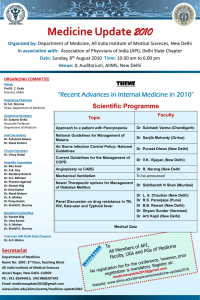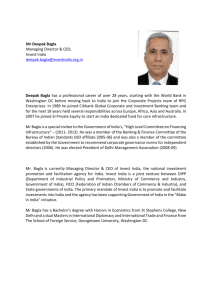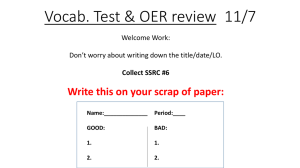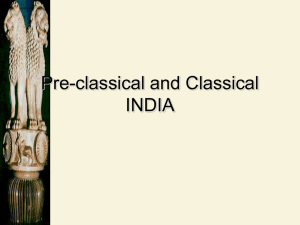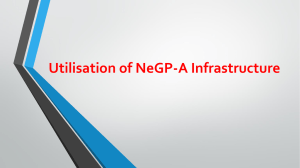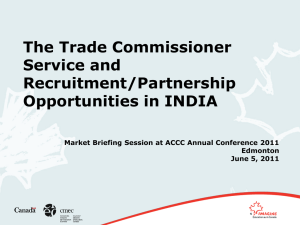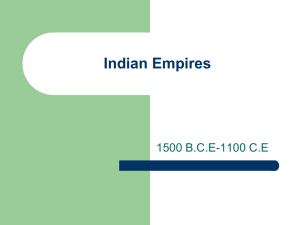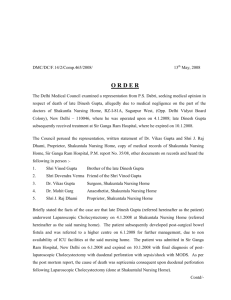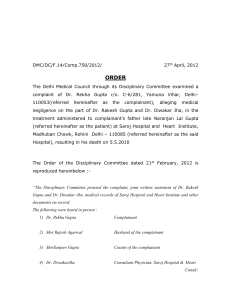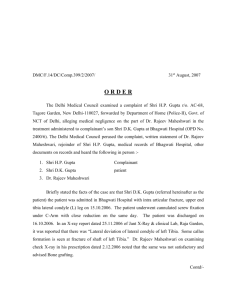Click - Udayan Care
advertisement
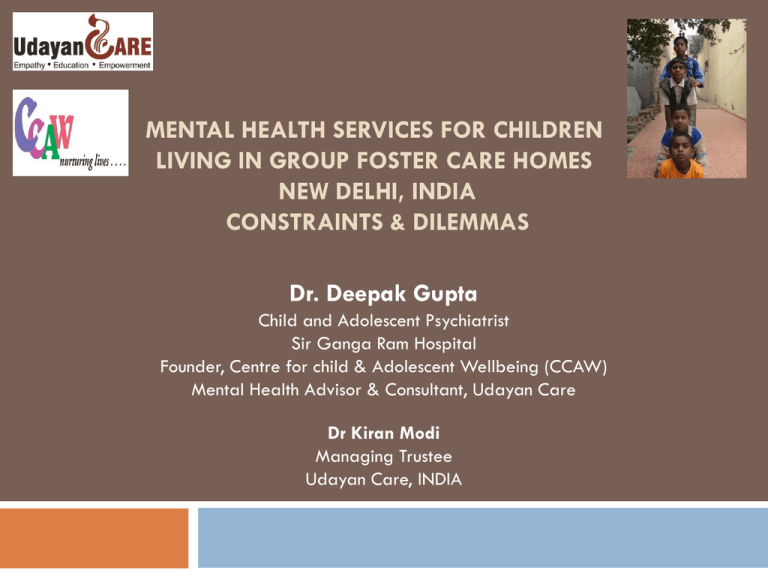
MENTAL HEALTH SERVICES FOR CHILDREN LIVING IN GROUP FOSTER CARE HOMES NEW DELHI, INDIA CONSTRAINTS & DILEMMAS Dr. Deepak Gupta Child and Adolescent Psychiatrist Sir Ganga Ram Hospital Founder, Centre for child & Adolescent Wellbeing (CCAW) Mental Health Advisor & Consultant, Udayan Care Dr Kiran Modi Managing Trustee Udayan Care, INDIA OUTLINE Bio-psycho-social perspective Mental Health Programme (MHP) at Udayan Care Constraints & Dilemmas Evolution Dr Deepak Gupta, New Delhi, India CHILDREN Who Reach Institutions BRING ALONG … Experiences of being Orphaned/ Abandoned/Lost A Past full of Utter Deprivation and Penury Street History And Mixed Experiences Huge Trauma: Physical, sexual and emotional abuse Lack of Basic Life Skills Need for Communication & Behavioral Modification Need to develop Social Skills Need to get Educated Dr Deepak Gupta, New Delhi, India What is good or bad for Mental Health of Children in Institutional Care A proposed “bio-psycho-social perspective” The array of mental health and behaviors associated with children in Foster Care has been difficult to account for with a simple cause-and-effect model. This apparent diversity can be explained in part by the heterogeneity of experiences of children in institutional care, the complexity of the confounds among and a host of moderating and mediating constitutional and environmental variables together with important individual differences in coping strategies that may come into play at different points in development in any given case. Dr Deepak Gupta, New Delhi, India Biopsychosocial Perspective CHILD Care Takers Organization/Society/legal norms Dr Deepak Gupta, New Delhi, India A bio-psycho-social perspective Why to understand? Holistic approach To understand individuality To enhance emotional & social wellbeing To build Resilience To nurture productive future and youth Dr Deepak Gupta, New Delhi, India Inbuilt mental health programme (MHP) Inbuilt mental health programme (MHP) is an essential component to promote positive mental health, early identification and treatment of mental health problems and rehabilitation. It is a comprehensive preventive and intervention programme ensuring that our children learn to come to terms with their traumatized past and look towards shaping their own future as we work as a cohesive team for holistic development of every child. Dr Deepak Gupta, New Delhi, India Mental Health Programme (MHP) Mental Health Programme constitutes: Skill building workshops for children Meetings at Homes Observation and Interaction with children Individual interventions Capacity building workshops for caretakers and mentors Meeting and Training programmes with social workers Research & Development Advocacy Dr Deepak Gupta, New Delhi, India Mental Health Team: •Child & Adolescent Psychiatrist (head) •Psychotherapist •Social workers •Clinical psychologist (assessment) •Administrative Staff •Volunteers Common Mental Health Problems Seen: ODD & Conduct Disorder ADHD Depression PTSD DSH Substance Abuse Attachment disorder Enuresis & Encopresis Intellectual disability Learning Disability Dr Deepak Gupta, New Delhi, India Constraints and Dilemmas Priority on physical health and education Care takers and mentors reluctance to accept mental health needs Its often taken for granted that if children have mental health problems/disorder then it is because of their past and nothing can be done Labelling of the child Evolving mental health challenges As children are growing the adolescent issues, relationship issues and sexuality issues emerging Career related issues, transition and settlement issues are bothering them Constraints and Dilemmas Bias against Medication Children reluctant for medications Children reluctance for mental health interventions Change of professionals Involvement of MH professionals in other admin work Change of professionals Lack of Human Resources Dr Deepak Gupta, New Delhi, India Evolution As homes and children are growing, MHP and MHP Team has grown over the years Work on “Prevention” Creating awareness & life skills workshop Early identification & interventions are being emphasized Holistic approach Training model and advocacy plans Longitudinal Research work Dr Deepak Gupta, New Delhi, India Conclusions Mental Health of children in Foster Care deserves to be addressed at every step. Both ‘prevention’ and ‘intervention’ need to be integrate at all levels of delivery of services for children in Foster Care in order to overcome various constraints and dilemmas that are associated with it. Dr Deepak Gupta, New Delhi, India THANK YOU Dr Deepak Gupta, New Delhi, India
